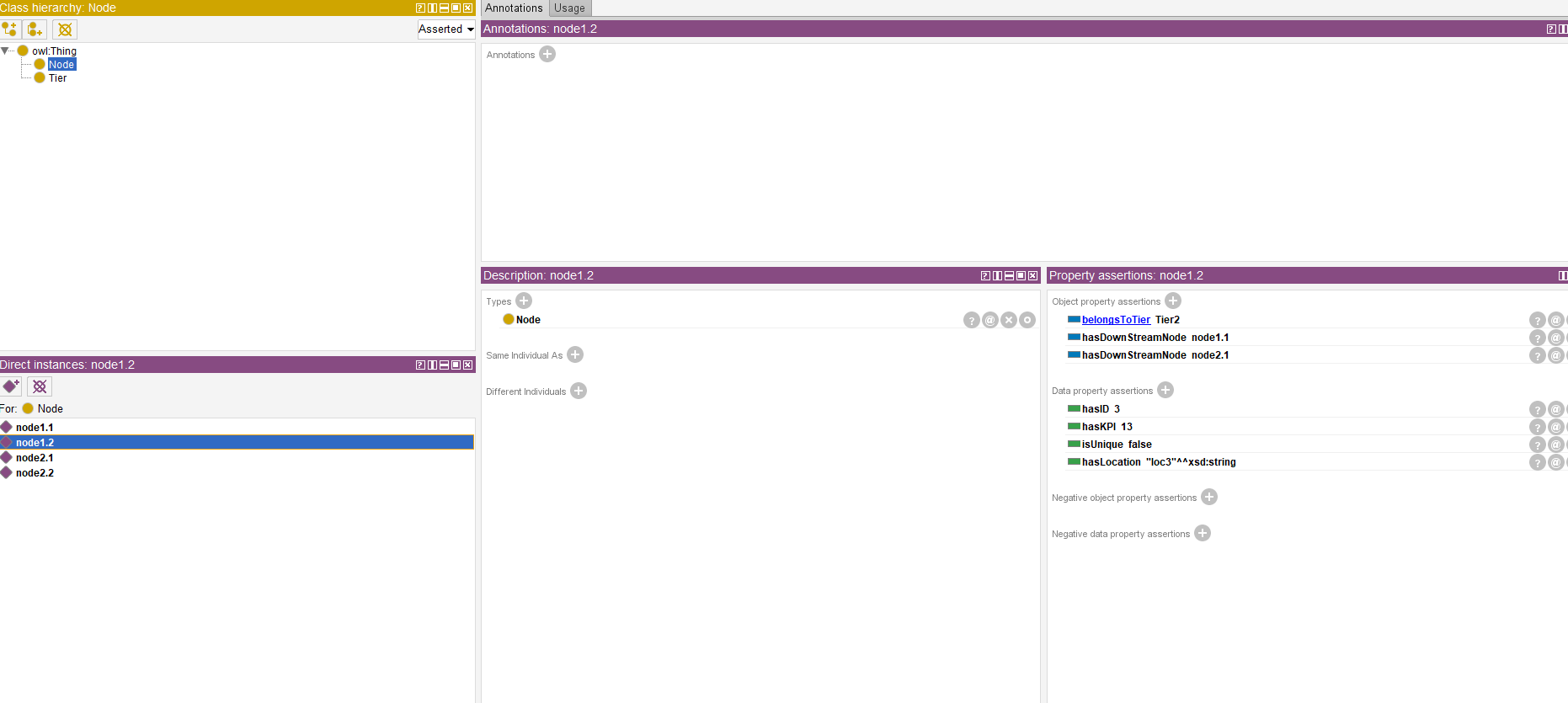Data property and object property reification
|
In my ontology creation . i have 2 class node and tier. i have created instances node1.1, node2.1, node1.2 and node 2.2 and for tier tier1 and tier2. i have created object properties and data properties.
in object property for example node1.2 hasUpstreamNode node1.1. i wanted to assert a data property isUnique (boolean) for example <Node2.2 hasDownStream Node2,1> isUnique True. can anybody help me how to do it please. i have pasted my code below. from owlready2 import * owlready2.JAVA_EXE = "C:///Users/MohapatraMan/Downloads/Protege-5.5.0-win/Protege5.5.0/jre/bin/java.exe" onto_path.append("/home/Projects/for_manas") onto = get_ontology("C:///Users/MohapatraMan/Desktop/New Folder/generator_ranjan.owl").load() #create required properties with onto: class hasUpstreamTIER(ObjectProperty): domain = [onto.Tier] range = [onto.Tier] #inverse = onto.hasDownStreamTier with onto: class hasUpstreamNODE(ObjectProperty): domain = [onto.Node] range = [onto.Node] #inverse = onto.hasDownStreamTier with onto: class hasID(DataProperty, FunctionalProperty): # Each drug has a single cost #ontology = onto range = [int] domain = [onto.Node] with onto: class hasKPI(DataProperty, FunctionalProperty): # Each drug has a single cost #ontology = onto range = [int] domain = [onto.Node] with onto: class isUnique(DataProperty, FunctionalProperty): # Each drug has a single cost #ontology = onto range = [int] domain = [onto.Node] number_of_tiers = int(input("How many Tier?:")) #create an empty list for storing current and previous nodes node_list = [] tier_list = [] previous_node_list = [] previous_tier_list = [] for i in range(number_of_tiers): y = onto.Tier("Tier{}".format(i + 1)) print(y) number_of_nodes = int(input("Number of nodes in Tier {}?:".format(i + 1))) for j in range(number_of_nodes): x = onto.Node("node{}.{}".format(j + 1, i + 1)) print('no of nodes:', x) x.belongsToTier.append(y) if i > 0: for node in previous_node_list[i - 1]: x.hasDownStreamNode.append(node) x.belongsToTier.append(y) if i > 0: for tier in previous_tier_list[i - 1]: y.hasDownStreamTier.append(tier) node_list.append(x) tier_list.append(y) previous_node_list.append(node_list) node_list = [] previous_tier_list.append(tier_list) tier_list = [] print("previous_node_list {}".format(previous_node_list)) print("previous_tier_list {}".format(previous_tier_list)) # Assigning Upstream Tiers iterator = 1 for i in onto.Tier.instances(): i_string = str(i).split(".")[-1] if iterator < len(previous_tier_list): # to make sure that the last node does not have an upstream try: print("{} has UpstreamTier {}".format(i, previous_tier_list[iterator][0])) i.hasUpstreamTIER.append(previous_tier_list[iterator][0]) except: print("error") else: # i.hasUpstreamTier.append([]) print("{} has no upstream Tier".format(i)) iterator += 1 print("---") # Assigning Upstream nodes for j in onto.Node.instances(): i_string = str(j).split(".")[-1] if int(i_string) < len(previous_node_list): # to make sure that the last node does not have an upstream for item in previous_node_list[int(i_string)]: print("{} has upstream Node {}".format(j, item)) j.hasUpstreamNODE.append(item) else: print("{} has no upstream Node".format(j)) for Node1 in onto.Node.instances(): val = input("Enter your location: ") val1 = [val] Node1.hasLocation = val1 print("{} has location {} ".format(Node1, val1)) for Node1 in onto.Node.instances(): ID = input("Enter your ID: ") Node1.hasID = int(ID) print("{} has ID {} ".format(Node1, ID)) for Node1 in onto.Node.instances(): Kpi = input("Enter your KPI: ") Node1.hasKPI = int(Kpi) print("{} has hasKpi {} ".format(Node1, Kpi)) #with onto: # sync_reasoner() #sync_reasoner_pellet(infer_property_values = True, infer_data_property_values = True) onto.save(file="Data_Generator2.owl") Thanks&Regards Manas Ranjan Mohapatra |

|
|
Administrator
|
In reply to this post by manas
Hi,
If I understand your problem well, you want to create a property called isUnique that has for range an RDF triple (for example <Node2.2 hasDownStream Node2.1>). This is possible in OWL, but only using an AnnotationProperty (and not a Data or ObjectProperty). You can define your property as follows: with onto: class isUnique(AnnotationProperty): range = [bool] Then you can use it as follows: isUnique[Node2.2, hasDownStream, Node2.1].append(True) Notice that AnnotationProperty cannot be functional, thus I used append above since the value is a list. Jiba |
«
Return to Owlready
|
1 view|%1 views
| Free forum by Nabble | Edit this page |

